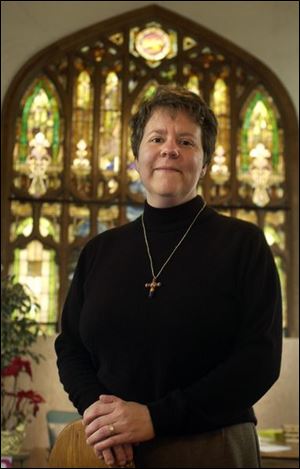
Easing the pain of ‘clobber' verses
2/7/2004
Pike: Spiritual director of Central United Methodist Church in Old West End.
The Rev. Cheri Holdridge and Tanya Pike want to ease the pain of the “clobber passages” that make people feel “beaten up by the Bible.”
“Clobber passages,” Ms. Pike said, are the five or six scriptures most often cited in condemning homosexuality.
“Most people have never taken on these scriptures one by one. It's scary,” she said.
Ms. Holdridge, pastor of Central United Methodist Church, and Ms. Pike, the church's spiritual director, said in an interview at their Old West End church this week that they believe the Bible is not clear-cut against homosexuality.
“Many people who have only read about Sodom and Gomorrah, or haven't read any of the Bible, assume it condemns homosexuality because of what others have told them,” Ms. Holdridge said. “They are surprised that it can be interpreted differently.”
Last week, Central began offering a six-week series of Sunday-morning classes to explore the different, nontraditional views of scripture and homosexuality. An identical course is being taught on Wednesday nights at Collingwood Presbyterian Church.
“I told the class, ‘I am not equipping you to argue with people and win; I am trying to give you an inner peace and to understand yourself,'” Ms. Pike said.
“It's a really long journey,” she added.
Central was one of the first churches to join the United Methodist's Reconciling Ministries Network, an organization of about 200 churches, formed 20 years ago, that welcomes “all persons, regardless of sexual orientation, to participate fully in its congregational life.”
Ms. Pike said she “came out” while being interviewed for the position of full-time United Methodist missionary and certified lay speaker. The denomination bans ordination of homosexuals, but it places no restrictions on sexual orientation for lay persons.
Ms. Holdridge, daughter of a United Methodist preacher, said she believes the Bible is the Word of God and scripture is true, “but I don't believe in a literal translation. You have to read it in the context of culture with the balance of experience.”
The pastor, who wears a rainbow-colored cross around her neck, is married and the mother of two young children whom she wants “to experience diversity and tolerance.”
“Some people think because we accept gays and homosexuals that we throw the Bible out,” Ms. Holdridge said. “We preach from the Bible. We're Christians. We're a Christian church.”
She said her views on homosexuality and the Bible changed after enrolling in seminary at Emory University in Atlanta.
“I grew up in West Texas. I didn't know any gay Christians who were out. At seminary in Atlanta, I met gay lesbian colleagues” and began to re-examine the scriptures on homosexuality.
Ms. Pike and Ms. Holdridge believe that verses frequently cited as evidence that the Bible condemns homosexuality actually are addressing issues of power, control, rape, prostitution, and group sex.
“It is not about same-sex committed relationships,” Ms. Pike said. “It's not an issue of sexual orientation.”
Ms. Holdridge said that in biblical times, society did not have a term for homosexuality because it was generally believed that everyone was heterosexual. But recent scientific studies have shown that people can be genetically predisposed to homosexuality, she said.
She said that when Sodom and Gomorrah is mentioned in the New Testament, it is in reference to a lack of hospitality, not homosexuality.
It is interesting, Ms. Holdridge said, that the Bible never quotes Jesus speaking on the topic of homosexuality.
“If it is so important, don't you think Jesus would have mentioned it? He was more concerned about money and divorce.”
The United Methodist Church uses “the Wesleyan quadrilateral” to determine its doctrine, balancing tradition, scripture, reason, and experience.
That approach led the Methodist Church to reverse its stance and oppose slavery in the late 19th century, she said, even though Paul approved of owning slaves, Ms. Holdridge and Ms. Pike said.
“The Methodist Church split over slavery,” Ms. Holdridge said. “But the majority of people realized that slavery was wrong and we reunited. We had misread the texts without cultural insight.”
She said the same criteria led the denomination to approve the ordination of women in 1956.
In April, the denomination will hold its quadrennial General Conference in Pittsburgh, and many United Methodist gays and lesbians are worried that delegates may seek to limit the roles of homosexual lay persons, Ms. Holdridge said.
The Reconciling Ministries Network and other reform-minded organizations will be at the conference to lobby for a more inclusive church, she said.
At the denomination's last General Conference, held in 2000, it conducted a service of reconciliation and apologized for once having condoned slavery.
“It took until 2000 to apologize for slavery,” Ms. Pike said, “it might be 3000 before the church apologizes to homosexuals. We will all be dead and buried by then.”
Classes on “how to deal with the ‘clobber passages'” are at 9:30 a.m. Sundays at Central United Methodist Church, 701 West Central Ave., and 7 p.m. Wednesdays at Collingwood Presbyterian Church, 2108 Collingwood Blvd.